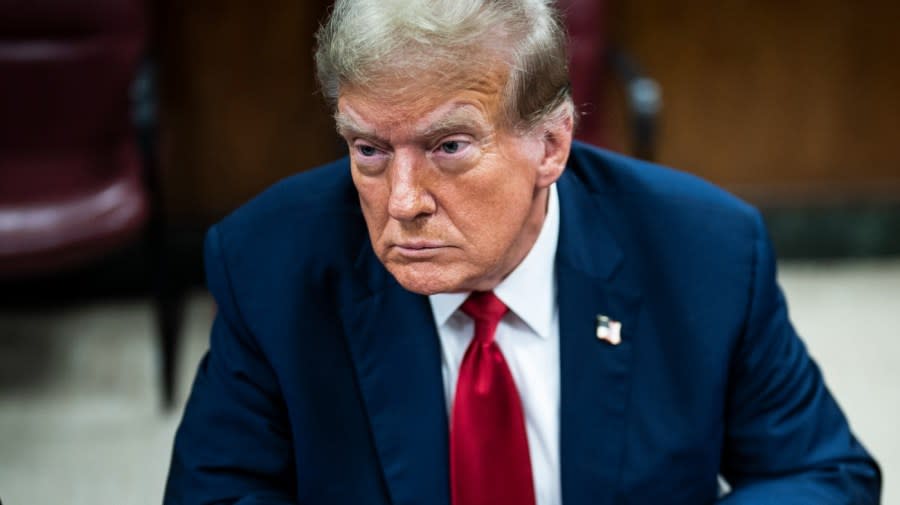‘I thought I could do this’: Anxiety takes toll on Trump hush money juror pool

NEW YORK – Selecting the jury for the first criminal trial of a former U.S. president was never going to be an easy task.
But several New Yorkers who could have served in the historic role indicated that even the possibility of sitting on former President Trump’s jury was too much to bear.
“I have to be honest. I feel so nervous and anxious right now. I’m sorry,” one woman said, holding back tears with a tissue in hand. “I thought I could do this, but I wouldn’t want someone who feels this way to judge me either.”
“This is so much more stressful than I thought it was going to be,” she added, before she was excused.
Anxiety and fear tore through the pool of potential jurors in Trump’s hush money case throughout four days of jury selection this week.
Some said the pressure of nonstop media coverage was too daunting, while others expressed a general unease about being one of 12 primary and six alternate jurors who will soon decide the former president’s fate in a case garnering global attention.
Then there was the politics of it all.
More than half of the 192 New Yorkers screened immediately indicated they couldn’t be impartial in a case where one of the most divisive figures in the country was at the center of it all. There was also a matter of varying degrees of separation from Trump, given the case is being tried in the city where he made his name.
For those who remained, many changed their minds as they went through the selection process. With Trump sitting about 15 feet away, some became flustered as they answered questions, while others became emotional and asked to be excused.
As one prospective juror left the courtroom, they quipped, “I just couldn’t do it.”
Trump often looked over to the jury box while following along with a copy of the 42-question survey the New Yorkers were asked to fill out, putting some jurors on edge.
“I’m not used to being on stage. I’m nervous,” said one prospective juror.
“You’re doing great,” the judge assured him.
Even a juror who made it through the entire selection process and was seated for the trial eventually changed tune. She expressed concerns about the intense press coverage, saying friends and family had questioned if she was a juror and that it began to affect her impartiality. It led the judge to admonish the media.
“I don’t believe at this point that I can be fair and unbiased and let the outside influences not affect my decisionmaking in the courtroom,” the woman said.
After the grueling four-day process, a jury of 12 Manhattanites and six alternates were selected for Trump’s historic hush money trial, where he’s accused of falsifying business records to conceal a deal with an adult film actress ahead of the 2016 election. Opening statements are set to begin Monday.
Trump pleaded not guilty and has denied any wrongdoing. He’s also repeatedly complained that, as a Republican candidate, he can’t get a fair trial in deep-blue Manhattan.
“We have a highly conflicted judge and he’s rushing this trial, doing everything he can for the Democrats,” Trump told reporters on the second day of trial. “This is a Biden-inspired witch hunt.”
“This trial is being watched by the whole world,” he said.
Beyond his comments in the courthouse hallway, Trump regularly railed against the trial on Truth Social, leading prosecutors to accuse him of violating his gag order multiple times. In one post, Trump claimed “liberal activists” were attempting to get on the jury.
His complaints came as his lawyers raced to dig through prospective jurors’ social media posts, sometimes uncovering derogatory posts about the former president and calling them back into the courtroom individually to grill them.
When one prospective juror was called in to discuss her post calling Trump “a racist, sexist, narcissist,” she appeared embarrassed.
“Oops, that sounds bad,” she told Trump attorney Susan Necheles when read the post.
Moments later, the woman apologized.
“I should apologize for the tone of some of my posts,” she told Trump as she withdrew her claim that the former president is a racist.
The judge ultimately granted the former president’s challenge and dismissed the woman.
Trump’s lawyers spent most of their questioning pressing prospective jurors on whether they had strong opinions about Trump. Many were reluctant to answer the question directly and criticize him.
“He’s a person, a politician, a businessman — I think that’s why people kind of struggle with this question,” one man said.
The trial is taking place in Trump’s hometown, New York City — the place that helped launch him to fame, and later, the White House.
One man suggested he’d been on a jury in a case involving Trump years ago and also knew some of the Central Park Five. When the group of Black and Latino teens were wrongfully accused of assaulting a white female jogger in the park in 1989, Trump took out a newspaper ad calling for their executions.
“Going back to Central Park, I knew some of the kids, their cousins,” the man said.
A lifelong New Yorker, working in law enforcement but a “wannabe hockey player,” the man reflected on a fondness for Trump, whose company fixed an ice-skating rink in Central Park that “nobody couldn’t fix.” Another man said he dreamed of living in Trump Tower when he was younger.
Despite jurors’ nervousness around Trump, he was a well-known entity to all.
“I’ve got opinions. I’m born and raised in Brooklyn, New York. I’ve kind of spent my whole life knowing about Donald Trump,” one woman said.
For the latest news, weather, sports, and streaming video, head to The Hill.


